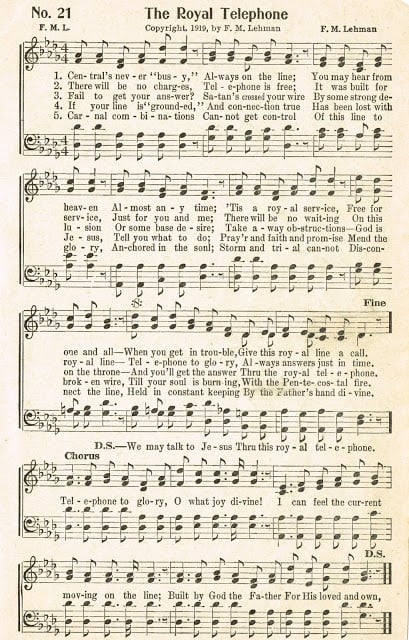Introit
Why is contemporary worship obsessed with the second person?
Opening Hymn of Third Person Praise
I was reminded of this strange phenomenon recently while working on a comparison of traditional hymn and contemporary texts. It’s true. When you look at the top contemporary songs, almost all of them speak directly to God instead of about God. In fact, out of the top ten songs on the current CCLI chart, only one, “Cornerstone” by Mote, Liljero, Myrin, Morgan, and Bradbury (Bradbury?…like William “Jesus Loves Me” Bradbury? Yep…) does not, likely because most of its text is lifted from Bradbury’s “My Hope Is Built on Nothing Less.” All of the others speak to God in the second person, either completely, or alternating awkwardly between second and third voices.
That’s one of the reasons why the text of Chris Tomlin’s “Our God” is so poor.
Our God is greater, our God is stronger,
God, you are higher than any other.
Tomlin almost does the impossible with a couple of his songs. “How Great Is Our God” is entirely in third person until the end, where he says…
Name above all names,
You’re worthy of my praise.
Chris, Chris. So close…
Even if we look at the top 20, there is only one song that can do it, and funny enough, it’s “In Christ Alone” by Townend and Getty.
Tomlin gives it one more shot with Amazing Grace (My Chains Are Gone). After copying a few of Newton’s stanzas (which are mostly first person) and adding a first person refrain, Tomlin does this.
The earth shall soon dissolve like snow,
The sun forbear to shine.
I think he’s going to do it!
But God, who called me here below
will be forever mine.
Almost there!
Will be forever mine.
Yes!
You are forever mine.
Rats!
A New Narrative
Certainly there’s nothing wrong with speaking to God in second person narrative. Many Psalms do it. Many hymns are prayer hymns, with a narrative addressed to God. But the unfailing frequency with which contemporary worship writers stay in the second person indicates a fundamental misunderstanding of what worship is. If you were to rely solely on these texts, you would think worship, or at least the best kind of worship, was getting alone with God and telling God how you feel about him. Many worship settings try to emphasize this even more with dim lighting and verbal encouragement from the leaders to “sing to an audience of one.”
But there are several problems with this.
First, worship is not about intimacy with God. To be sure, we only worship God in spirit and truth if we have been converted, but it’s not about cuddling up on our comfy Mattress/God and saying sweet things to him. It’s an infinitely broader undertaking.
Second, worship is not prayer. Prayer is a worshipful act, but not all worship is prayer. Singing to God in the second person does not make for a more worshipful action.
Third, when we worship corporately, we are supposed to be singing corporately. It’s okay to address God in the second person in this context, but it’s not necessary, and it doesn’t make it any more worshipful, and if done pervasively, can detract from the corporate goal of the gathering.
Fourth, and most importantly, worship is a response of heart and action. Anything we do in response to God’s self-revelation and work in our lives is worshipful. This could be prayer (or singing a prayer hymn), but it could also be singing about God to each other. We can worship by reading Scripture, reciting creeds, listening to a sermon, or engaging each other in theological discussion. But let’s branch out even more. We worship when we respond to God’s call to compassion by feeding the hungry. We worship when we love our neighbors. We worship when we choose mercy, grace, and peace. We worship when we fight for justice. God doesn’t have to be our audience. We worship with any action done in response to the Gospel of Christ and its call on our lives.
I think there’s one other issue here, and it’s a testimony to our imposing human limitations on the Divine. Have you ever been asked to pray for something at a particular time? Something like, “Pray for my mom tomorrow at 3. She’s having surgery.” Or, “I have a huge job interview tomorrow morning at 7:30. If you’re up, why don’t you pray for me around that time?”
Think about it. What difference does it make if we get up to pray at 7:30 or take care of it the night before? If God is who he says, absolutely nothing. If we pray ahead of time, but sleep through our alarm, there’s no problem. God doesn’t forget.
Similarly, if you are saying good things about me to someone else in my absence, I won’t know about it unless one of you tells me. That’s just one of the problems with the whole “not being omniscient or omnipresent” thing. (Being human is such a freaking drag.) But God knows. Whether you say, “All thy works shall praise thy name” or “All God’s works shall praise his name,” God will get the message. You’re not making things easier for him to understand by addressing it straight to him.
A Refocused Recessional
So next time you feel like grabbing God’s face and pointing it at yours like a small child’s and saying, “Look at me when I’m talking to you,” remember what worship really is, and more importantly, who God really is.
It’s time we get this straight. All of us. Songs that speak directly to God are fine and good, but they are no more worshipful than songs that remind us of what we know of God from the Bible and his work in our lives.
Just for fun, here’s one of my favorites.
If you like what’s going on here, please share by clicking your choice of the buttons below. Thanks.












